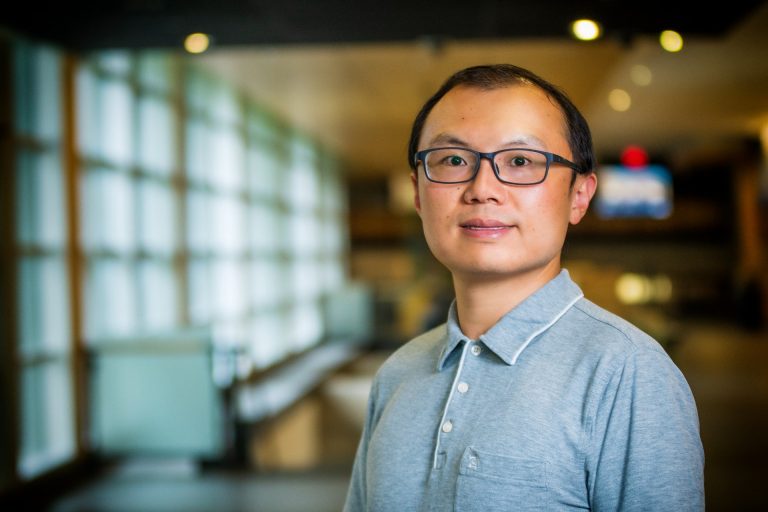Health Canada recruits a Concordia professor for its Science Advisory Committee on Pest Control Products

Xianming Zhang, assistant professor of environmental chemistry in Concordia’s Department of Chemistry and Biochemistry, has been invited to join Health Canada’s new Science Advisory Committee on Pest Control Products.
The panel of nine researchers from across the country will provide independent guidance to the Government of Canada’s Pest Management Regulatory Agency.
Zhang was selected based on his previous experience and ongoing research on the environmental processes and risk of chemicals used in different sectors of modern society, including agriculture.
“Using approaches that integrate laboratory experiments, field monitoring and computer model simulations, my research focuses on the sources of chemicals in the environment, their transportation and transformation processes,” he explains.
“These processes impact how the chemicals can get into ecosystems and the human body. This information allows us to determine the associated ecological and human health risks of these chemicals.”
Zhang arrived at Concordia in 2021 after earning his BSc from Peking University and MSc and PhD from the University of Toronto and completing postdoctoral training at Harvard University. He has experience with government agencies as well.
“I also worked as a scientific evaluator with the government, for example, at Health Canada’s Pest Management Regulatory Agency, assessing environmental fate processes and exposures of pesticides,” Zhang reports.
The committee’s researchers bring a range of perspectives from their various areas. “They will contribute different parts to the science-based regulations of pesticides and achieve the final goal, which is to ensure that the pesticides will not cause harmful effects to the population or environment,” he says.
Focus on SDGs
Zhang also recently assembled a team of graduate and undergraduate students to work on a Sustainability Co-design Project funded by Concordia’s Centre For Teaching and Learning. The team is redesigning the course Air, Water and Soil Processes (CHEM 283) to emphasize, in part, the United Nations Sustainable Development Goals (SDGs).
“It’s an introduction to environmental chemistry course for chemistry and biochemistry students and those in the Environmental and Sustainability Science program. The course covers the fundamentals of environmental chemistry related to air, water and soil,” Zhang notes.
“The course leads the students to think of the environment as a whole system. Oftentimes, environmental issues happen in one environmental medium, for example in the air, but that can affect and be affected by chemical processes in other environmental media,” he says.
“Most content covered in the course has implications for our daily lives, for example, UV radiation, sunscreen and their associated health and environmental impacts.”
Zhang first taught CHEM 283 in the winter 2022 term. “The Sustainability Co-design Project provides a great opportunity for instructors to work with students to infuse sustainability concepts into the course,” he says.
“Currently I’m working with the two students, Guzal Riskulova, an undergraduate in environmental and sustainability science who took the course in the winter semester, and Cassandra Johannessen, a PhD student in the Department of Chemistry and Biochemistry,” he says.
“We made a plan on how we are going to incorporate sustainability components into the course, to enrich the course’s learning goals and to make the course more inclusive with newly designed activities and ways of assessment.”
Partnership is key
Zhang says his research and teaching contributes to many of the 17 SDGs, including SDG 6 – Clean Water and Sanitation, SDG 11 – Sustainable Cities and Communities, SDG 14 – Life Below Water, and SDG 15 – Life on Land. Now he’s looking beyond that.
“I think SDG 17 – Partnerships for the Goals is essential to achieve all the other SDGs. Partnerships are key to addressing environmental issues,” he says.
“I have established partnerships with, for example, Environment and Climate Change Canada. The partnerships provide opportunities for interdisciplinary and cutting-edge scientific investigations that have led to some impactful outcomes, like the study highlighted in our recent paper in Nature,” Zhang says.
“My team will also be working in collaboration with partners in the private sector, to investigate, for example, chemical additives used in rubber tires.”
In line with SDG 17, one of Zhang’s aims is to engage the larger community in his research and teaching at Concordia. “We can provide information for how people can try to minimize their exposure to chemicals of environmental and health concerns in their daily life and we also hope to get the local community involved in our research as citizen scientists.”
Learn more about Concordia’s Department of Chemistry and Biochemistry.


